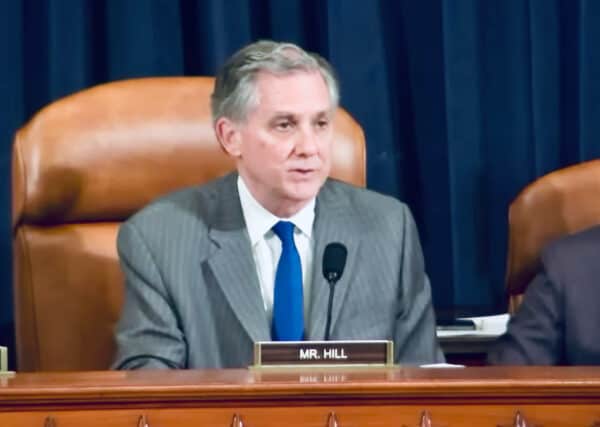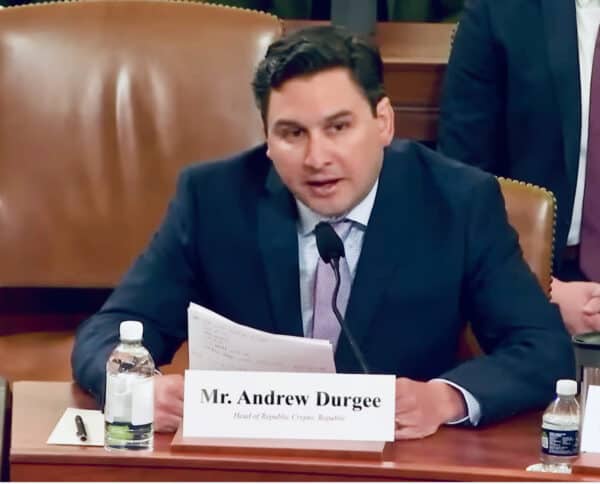
Last week a hearing took place that joined the House Subcommittee on Digital Assets, Financial Technology & Inclusion with the House Agriculture Committee’s Subcommittee on Commodity Markets, Digital Assets, and Rural Development entitled “The Future of Digital Assets: Measuring the Regulatory Gaps in the Digital Asset Markets.” The hearing tackled the challenges in the digital asset market and the current opaque regulator environment for digital assets that may be securities, commodities, utilities, or maybe all of the above.
The Chair of the Subcommittee on Digital Assets and Fintech, Representative French Hill, opened his remarks by indicating he believes there is bipartisan support to craft new rules stating:
“… if we fail to provide a functional framework for digital assets in this country, all we’re doing is forcing this activity to happen on offshore exchanges, rather than in a regulated US environment—and this will hurt American investors more than anything,” adding that “… we’re trying to apply the principle of ‘same risk, same regulation’ to amend current law to establish the functional regulation of digital assets, where market participants are brought into the regulatory perimeter in a way consistent with longstanding investor protections that are tailored to the unique risks and benefits of the digital asset ecosystem.”
Hills said both the Securities and Exchange Commission (SEC) and the Commodities Futures Trading Commission (CFTC) play a vital role while asking the two agencies to support the Committee’s work. The SEC has been vocal in its statements that almost all digital assets are securities and thus regulated by the Commission.
Ranking member (Democrat) of the Digital Assets Subcommittee Stephen Lynch was not as convinced that new laws are needed as existing laws may be sufficient to effectively regulate digital assets describing the industry as “mass non-compliance,” adding that a new carve-out is redundant and unnecessary.
Currently, the Republicans have embraced the innovation side of the discussion while recognizing the need for strict, clearly defined rules. Some Democrats lean towards promulgating new rules, but the default is investor protection at all costs.
So what did the witnesses say?
Testifying in front of the hearing were:
- Andrew Durgee, Head of Republic Crypto, Republic
- Matthew Kulkin; Partner and Chair, Futures and Derivatives Practice, Wilmer Cutler Pickering Hale and Dorr LLP; former Director, CFTC Division of Swap Dealer and Intermediary Oversight
- Marco Santori, Chief Legal Officer, Kraken Digital Asset Exchange
- Daniel Schoenberger, Chief Legal Officer, Web3 Foundation
- Timothy Massad, Research Fellow, Harvard Kennedy School Mossavar-Rahmani Center for Business and Government and Director, M-RCBG DigitalAssets Policy Project
- Michael Blaugrund, Chief Operating Officer, New York Stock Exchange

Durgee, the non-attorney of the group, shared the perspective of Republic – the largest securities crowdfunding platform in the world, enabling online capital formation in the US, Europe, and Asia.
Durgee reflected on securities crowdfunding in prepared testimony, stating that Reg CF and Reg A+ are powerful tools to provide access for those typically left out of some of the greatest forms of wealth creation – venture capital.
“Before Reg CF, it was almost impossible for a non-accredited investor to invest in private companies, only widening the gap in wealth inequality. Reg CF changes that. In the venture and startup world, the founders and their teams seek to solve a problem or gap in the market. Like these entrepreneurs, you too, members sitting members here today, have the potential to be innovators and visionaries solving a much bigger problem than any one startup does. It is regulatory innovations such as Reg CF that can propel economic well-being and opportunity for all.”
Durgee said there is a need for another agency to regulate digital assets that are not securities adding there should be a trusted intermediary involved in the transaction.
Congress should tell the SEC to adopt rules that allow intermediaries to act as brokers or exchanges in regard to digital assets, stated Durgee.
“the SEC must not overstep its bounds and create potentially conflicting regulatory regimes without Congressional direction.”
Durgee was critical of the rule-making being pursued by the SEC that addresses Alternative Trading Systems (ATSs) as most view the proposal as a lightly veiled attempt to regulate digital assets without mentioning them.
He said the US is falling behind its peers, mentioning the European Union legislation addressing digital assets (MiCA). Other jurisdictions are doing the same.
Kulkin, a CFTC veteran, said the largest digital assets are commodities, alluding to Bitcoin, Ethereum, and perhaps some other digital assets. Kulkin said there is a “natural delineation” between digital securities and digital commodities advocating for the CFTC to play a bigger role in it regulating spot markets – but regulation is necessary to clarify roles.
Santori, a digital asset OG, stated the gaps in US regulation require Congress to act and effectively regulate digital asset markets. Congress should:
“Establish a functional standard and process for drawing clear jurisdictional lines; Create a viable path to regulate centralized digital asset exchanges where SEC jurisdiction has been defined by Congress; Expand CFTC authority to regulate spot digital asset markets and exchanges; Mandate interagency cooperation to facilitate coordinated oversight over digital assets and centralized exchanges; and Define transitional arrangements to minimize market disruption and protect retail investors.”
Schoenberger reviewed the evolution of Polkadot and its native token DOT. Starting as a security in its initial issuance, over time, DOT became sufficiently decentralized to no longer be considered a security under the Howey Test. Last November, the Web3 Foundation said that DOT had “morphed” from a security to software. He added that the Web3 Foundation looks forward to helping Congress “develop a comprehensive legislative framework for all token classifications in the U.S. and are confident that with clear laws, the U.S. will continue to lead the world in innovation.”
“The United States is facing two primary obstacles to fully unleashing the power and innovation of blockchain and Web3 technology. The first is the lack of a comprehensive legislative framework for digital assets and blockchain technology. The second is an attempt by some to apply laws and regulations not specifically designed for blockchain technology and the digital asset space,” stated Schoenberger.
Former CFTC Chairman Massad said Congress should pass a law that any platform that trades in Bitcoin or Ethereum must comply with a “set of core principles” unless they are registered with the SEC or CFTC.
“The principles would include protection of customer assets, prevention of fraud and manipulation, prohibition of conflicts of interest, adequate disclosure to investors, regular reporting, pre and post trade transparency, risk management and governance standards, among others.”
Perhaps rules could be crafted by a Self-Regulatory Organization (SRO), said Massad, describing his approach as “simple,” addressing the main problem of ensuring investor protection at the centralized exchanges where over 90% of transactions take place.
The NYSE representative stood out from the other witnesses as he said the existing exchange regulatory framework can accommodate digital assets with a few adjustments. NYSE is part of ICE which also operates BAKKT – once a trading platform, now more of a backend provider for digital assets. Blaugrund said:
“…we believe there is a significant benefit to utilizing the existing framework for public securities trading and extending it to digital assets.”
Most industry participants expect stablecoin legislation to first grace the House floor for a vote – with a good chance of being approved and heading to the Senate for a vote. A broader regulatory update for digital assets that are securities, commodities, or something else is a taller task. The Chairman of the House Financial Services Committee, Patrick McHenry, has indicated his determination to tackle tough topics, like Fintech innovation, capital formation, and digital assets with vigor – so expect a comprehensive digital asset bill later this year.
As Congress operates on a two-year cycle, there is no telling what will happen beyond 2024 – a Presidential year that may define the future of digital assets in the US. McHenry knows time may be short, and he is willing to push forward on issues that past sessions have been unable to resolve.
You may watch the entire hearing here.

